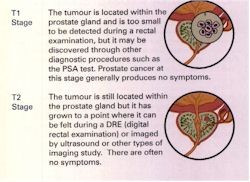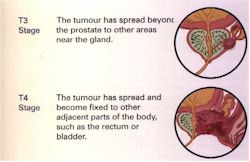|
|
||||||||||||||
|
Stage of prostate cancer |
||||||||||||||
This means how advanced the cancer has become at that moment in time. It categorises patients into clearly defined groups, each one having its own prognosis and optimal treatment strategy. The most widely used staging system is TNM but others including the Whitmore-Jewett System is popular in the USA:- TNM Classification of Prostate Cancer (Modified from Schröder. Et al, 1992) TO - No evidence of primary tumour T1 Clinically unapparent tumour, impalpable and not visible by
imaging T2 Tumour confined within prostate T3 Tumour extends through the prostate capsule T4 Tumour is fixed or invades adjacent structures Regional Lymph Nodes Distant Metastases Whitmore-Jewett Staging System A1 Microscopic focus of well-differentiated adenocarcinoma in up to three foci of transurethral specimens or enucleation; clinically not apparent on rectal examination A2 Tumour not well differentiated or present in more than 3 areas B1 Asymptomatic palpable nodule <1.5cm; normal surrounding prostate; no capsular extension; normal acid phosphatase B2 Diffuse involvement of gland; no capsular extension; normal acid phosphatase C Extension local tumour with penetration through the capsule; contiguous spread may involve seminal vesicles, bladder neck, lateral side wall of pelvis; acid phosphatase may be elevated; normal bone scan D1 Metastases to pelvic lymph nodes below aortic bifurcation; acid phosphatase may be elevated D2 Bone or lymph node metastases above aortic bifurcation or other soft tissue metastases Further general information Your doctors and specialist nurses are in an ideal position to give you relevant information on your disease and treatment as they know your individual circumstances. Cancerbackup has a help line (0808 800 1234) and a prize winning video available in English, Italian, Urdu, Bengali, Gujarati & Hindi explaining Radiotherapy & Chemotherapy. Cancernet.co.uk has over 500 pages describing cancer, its management, practical tips and tool which patients, their carers and their doctors have found helpful during the cancer journey. |
||||||||||||||






